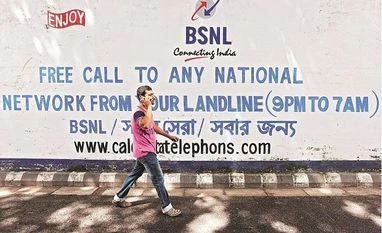Bharat Sanchar Nigam (BSNL), despite a revival package from the government more than a year ago, has not been able to start its 4G services.
Making things worse for the cash-strapped firm, a government-appointed technical committee has directed it to discontinue its 2G operations.
“A majority of the committee members recommended BSNL discontinue 2G services,” an official in the know told Business Standard.
BSNL is opposed to the suggestion because more than 60 per cent of its mobile revenue comes from 2G.
It is understood that the panel has insisted on the use of 4G alone.
While Reliance Jio does not have 2G services, both Bharti Airtel and Vodafone Idea have begun the process of re-farming 2G spectrum to extract better use out of it.
Sources said the committee agreed only on the upgrade of the base transceiver station, or BTS, which connects mobile devices to the network supplied by the lowest bidder, which is Nokia for tenders catering to the south and west zones.
The company has argued that more than 60 per cent of 4G-compatible BTSs are supplied by ZTE, for which the committee has not given permission.
It has said a majority of customers in lower-income groups do not have access to a smart phone and hence moving lock, stock, and barrel to 4G, operable only on such phones, would mean shutting out this category.
In its comments to the Department of Telecommunications (DoT), the company has said domestic gear makers do not have the technology to supply it the required equipment.
“If the panel’s suggestion is taken into account then the company will have separate vendors for core and other equipment, which will escalate the expenses of BSNL,” the official quoted above said.
However, DoT officials say with the suspension of 2G services, the company would save expenditure on electricity and maintaining old and obsolete technology.
“If 2G BTS is stopped, the electricity bill can be reduced by 66 per cent,” the official said.
BSNL had sought permission to launch 4G services using the existing infrastructure and BTS by upgrading over 49,000 4G-compatible BTSs, which the company has procured. However, the panel denied permission.
Besides, BSNL is gearing up to take over the services of Mahanagar Telephone Nigam Ltd (MTNL) in the Mumbai and Delhi on January 1.
The company will start by providing mobile services and then take over MTNL’s landline operations.
BSNL is expected to launch the pilot of its 4G services in Delhi and Mumbai five-six months after taking over the operations of MTNL.
For launching 4G services, the proof of concept (POC) will be approved by the Prime Minister’s Office. POC determines whether the equipment supplier is fit to deliver the gear and is likely to be completed by mid-2021 and the tender for sourcing the telecom equipment will be floated after that.
The government, which has 57 per cent in MTNL, has not found feasible the plan of merging the two companies.
To enable a seamless merger, the government holding in both the public-sector firms should be 90 per cent, as mandated by the Securities and Exchange Board of India.
The government on October 24 last year approved Rs 68,751 crore as a revival package for the two.
The package included raising sovereign bonds of Rs 15,000 crore to meet the immediate capital requirements of the companies, 4G spectrum allocation worth Rs 20,140 crore, Rs 29,937 crore for a voluntary retirement scheme (VRS) covering 50 per cent of their employees, and Rs 3,674 crore for goods and services tax, that will be levied upon the allocation of radio waves.
Unlock 30+ premium stories daily hand-picked by our editors, across devices on browser and app.
Pick your 5 favourite companies, get a daily email with all news updates on them.
Full access to our intuitive epaper - clip, save, share articles from any device; newspaper archives from 2006.
Preferential invites to Business Standard events.
Curated newsletters on markets, personal finance, policy & politics, start-ups, technology, and more.
)